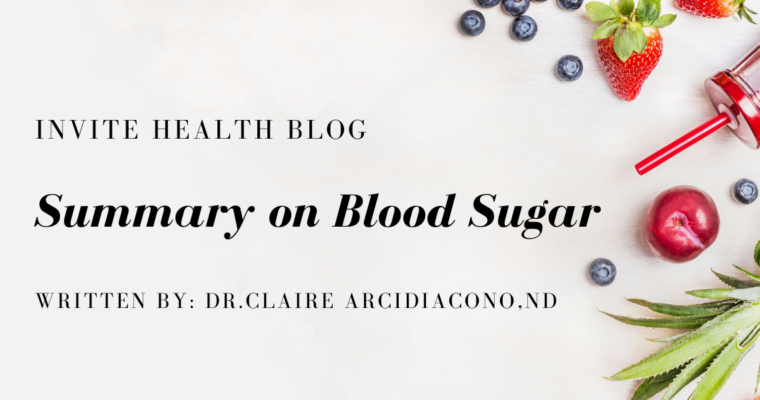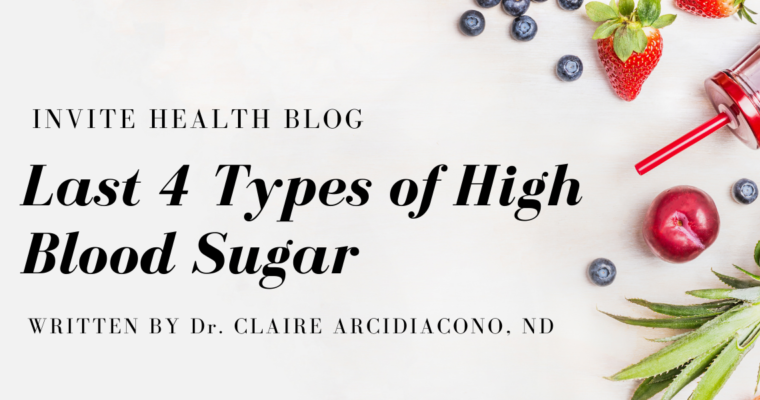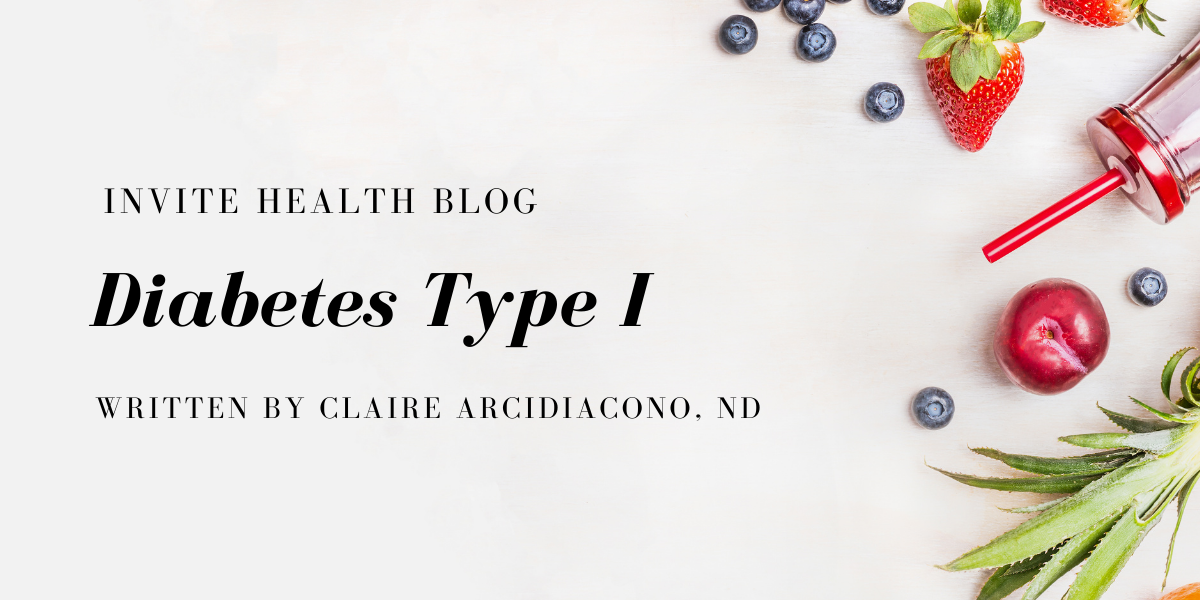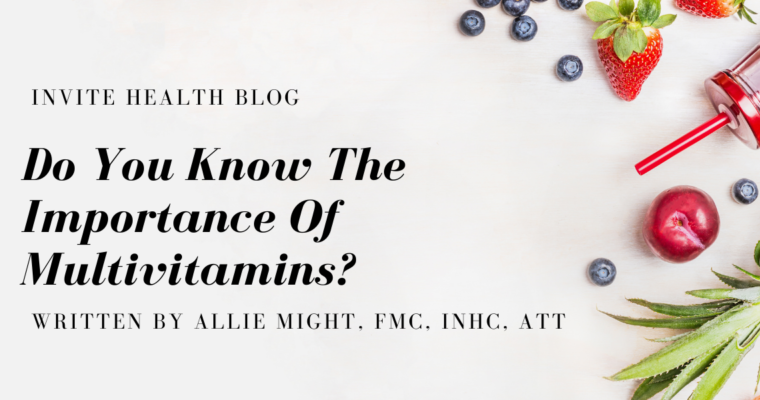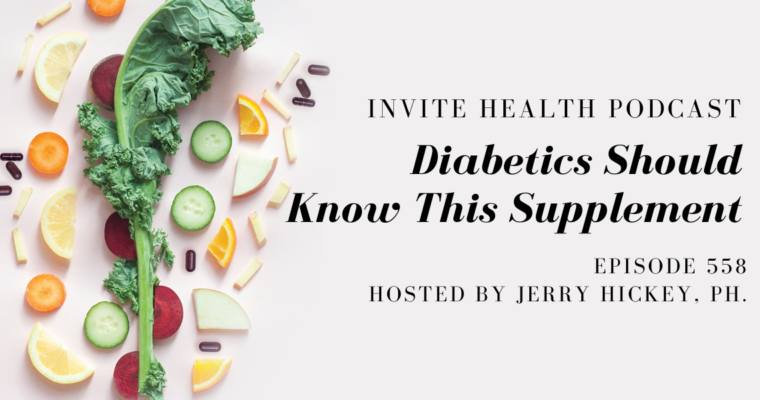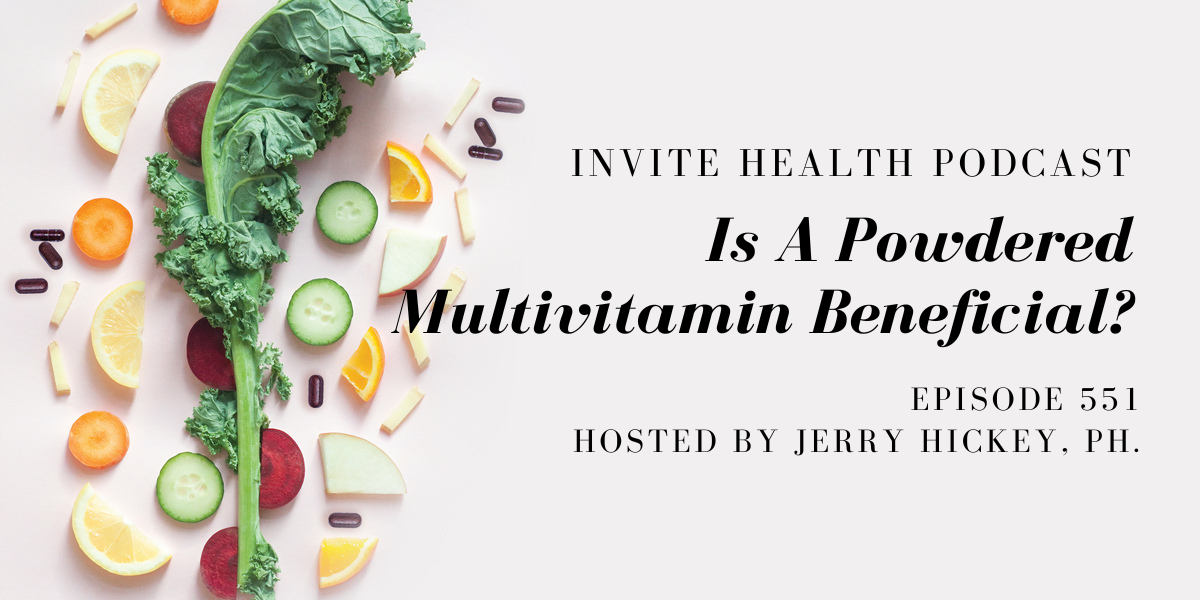Who Would Benefit From A Powdered Multivitamin
Subscribe Today!
Please see below for a complete transcript of this episode.
Who Would Benefit From A Powdered Multivitamin – InViteⓇ Health Podcast, Episode 551
Hosted by Jerry Hickey, Ph.
*Intro music*
InViteⓇ Health Podcast Intro: Welcome to the InViteⓇ Health Podcast, where our degreed healthcare professionals are excited to offer you the most important health and wellness information you need to make informed choices about your health. You can learn more about the products discussed in each of these episodes and all that InViteⓇ Health has to offer at www.invitehealth.com/podcast. First time customers can use promo code PODCAST at checkout for an additional 15% off your first purchase. Let’s get started!†
*Intro music*
Jerry Hickey, Ph.: [00:00:40] Many studies show that an older people who consistently use a multivitamin with minerals, this has very strong protective effects. So in research with older people who consistently use a multivitamin, they have a reduced risk of cancer, according to a number of high quality studies. They have a lower risk of a heart attack, once again, many studies. They have a reduced risk of developing coronary heart disease, the biggest killer on the planet, once again, many studies. A reduced risk of developing eye diseases like cataracts. A reduced risk of memory loss, many good studies also improve memory function. Now, this is actually being demonstrated in all age groups that a multivitamin with minerals supports brain activity. And this is true. Research shows that even in young, fit, healthy people in their twenties and thirties and forties, they get benefit for their brain, for brain energy and brain performance if take a multivitamin versus not taking one. So virtually everyone can benefit to a point, to a degree from taking a multivitamin and mineral. But especially the elderly and people with certain disease conditions and will go into this. However, some people can not absorb the nutrients from food or pills. And I’ll go into the reasons why there are many causes, including taking certain drugs, certain diseases, surgical procedures and tolerance to foods. These people likely, in my opinion, strongly my opinion is strong about this. They should switch to a high quality powdered multivitamin with minerals.† [00:02:31]
[00:02:33] So welcome to my episode. Who would benefit from a powdered multivitamin and mineral? Hi, my name is Jerry Hickey, I’m a pharmacist. I’m a nutritional pharmacist. I’m a licensed pharmacist. I’m also my background is biochemistry and of course, nutrition. Now, as far as our episodes the InViteⓇ Health Podcasts episodes you could find them all for free wherever you listen to podcast or just go to invitehealth.com/podcast and please leave us a review and subscribe. That’s very helpful for us. They can also listen to us on Facebook, Twitter and Instagram at InViteⓇ Health and by the way, all the information on this episode is listed at the episode description.† [00:03:12]
[00:03:14] So a well-made, powdered multivitamin and mineral. I’ll just refer to that as a multi. From here on in, it’s easier to swallow. It’s absorbed faster. It’s absorbed more completely. You have a better chance of absorbing it if you have issues. So you want a nice, clean, well-made multivitamin with enough of the ingredients in there. So let’s just go to regular multivitamin use this is a very recent study. It’s a great example of why a multivitamin is so important. By the way, many US adults report taking a multivitamin. So this is the Cosmos study. The Cosmo study is a double blind, placebo controlled, randomized human clinical trial, which means it’s a state of the art top notch gold standard human study. It’s by the Fred Hutchinson Cancer Research Center in Seattle. They turn out a lot of high quality research. It’s by Brigham and Women’s Hospital up in Boston. They’re affiliated with Harvard Medical School and Harvard School of Public Health. They do great work. It’s 3.6 years long and includes many adults, older adults. So we call that a well powered study. It’s long enough and there’s enough people in it for it to mean something. So all the women are over 65 in the study and all the men are over 60. So the study finding, it’s published in the American Journal of Clinical Nutrition, which is the Journal of the American Society of Nutrition. These are very serious people. It’s a very well controlled journal. The trial included 21,442 men and women. So they did a subset to look at the effects of a multivitamin on brain function. So a subset of these people I put, they all had to be over 65, 2200 people. They were on a multivitamin and they had a very good response neurologically. First of all, that memory was much less likely to decline. So they were less likely to have subjective memory loss where you notice you’re starting to forget words, etc.. It’s not a serious thing and it’s a common thing as we age, but you know who wants it. But they were also much less likely to have severe memory loss. So this is a really important finding. The multivitamin made their brain sharper. It improved their memory. It improved their executive function. You know, like keeping track of things, keeping track of time, getting your work done on time, multitasking, etc.. Now, why would a multivitamin help? Well, there’s a lot of reasons. One, as you get older, it’s harder to absorb nutrients from food. Many older people are lacking key nutrients like zinc, magnesium, sometimes even calcium, vitamin D, a vitamin B6, vitamin B12, folate. These are all very important nutrients. So we’re making sure these people are getting the nutrients. That’s the first thing. Secondly, the brain is a super high energy organ and it takes a lot of energy from your meal and it soaks up the vitamin C and A, B vitamins. So when you give an older person a little bit more vitamin C and B vitamins, you’re protecting their brain better and you’re giving them B vitamins for energy. But there’s a second outcome from getting B vitamins. It lowers homocysteine in the brain. Homocysteine is a natural byproduct of the brain from eating protein and getting the certain amino acids. The problem is if homocysteine gets elevated in the brain, it can lead to depression and it can also lead to Alzheimer’s disease, according to quite a few studies. So the B vitamins lower homocysteine. So that could be a second reason. You’re literally reducing robbing and damage to the brain by getting the B vitamins. So these could be the possible associations. Of course, there’s going to be other associations also.† [00:07:33]
[00:07:35] But here’s another finding, and this is the key finding of the study, because they were looking at cancer and a group of 21,442 elderly people, both men and women, the risk of lung cancer was reduced by 38%. So I mean, clearly, there should be motivation for older people to use a multivitamin. If the government was doing its job and telling older people about this, I think people would consider it extremely important. So I’m telling you about it, but I’m only a little voice. But, you know, if you’re listening, you’re getting good info here. So now we have to look at what affects vitamin and mineral absorption from food, from tablets. Many commonly used drugs, for instance, NSAIDs. Millions and millions and millions of Americans happily use NSAIDs. They can even go into a gas station and buy Advil and Aleve. And a lot of these drugs, they know, they don’t know the ramifications. We’ve done podcast episodes on this, like how these some of these drugs raise your blood pressure can cause intestinal bleeding, affect the eyes, affect your hearing, can affect the kidneys, raise your blood pressure. I mean, there are consequences to using these drugs if you use them consistently. I mean, if you only use them 1 to 3 days for a backache, you’re fine. But if you use inconsistently, there’s issues. But one of the issues is almost all of them inflame the lining of the intestines. This makes it harder to absorb nutrients. Nobody’s telling you this. You’re not hearing this on TV.† [00:09:10]
NONPRESCRIPTION DRUGS THAT DEPLETE IMPORTANT NUTRIENTS, PART 1 – INVITE HEALTH PODCAST, EPISODE 482 >> Listen Now!
[00:09:12] Antibiotic therapy, antibiotics. Many antibiotics like ciprofloxacin and tetracycline, etc., kill a wide swath of good bacteria that affect your ability to break down foods and absorb the nutrients from foods because the nutrients are tiny. They have to break down the food to release the nutrients, but especially tetracycline, because tetracycline directly attaches to minerals. So that’s a double whammy. It’s killing good bacteria. It’s attaching to your minerals you can’t absorb them. Proton pump inhibitors. Now, proton pump inhibitors are needed drugs, but I think they’re overused. They use for GERD, you know, severe reflux, severe heartburn, consistent heartburn, ulcers, stomach and intestinal infections by Helicobacter pylori. So examples of these would be omeprazole, that’s probably the most commonly used one. Nexium, which is that little purple pill, Protonix, Prevacid, Dexilant. Why are they a problem? They’re reducing acids in the stomach, which prevents you from releasing nutrients. So they’re affecting the PH of the stomach and the upper part of small intestine. And this can really hamper the absorption of minerals like calcium, magnesium, zinc and iron. This can really affect the absorption of B vitamins like B12, and folate. So it’s an issue.† [00:10:38]
[00:10:40] Now, we’re not discussing all of the things that affect the amount of vitamins and minerals in your body and other nutrients. I’ve done that. I’ve spoken about drugs that affect the level of nutrients in your body. That’s a different thing. That’s a drug induced nutrient depletion. That’s an important thing to know if you’re on drugs, because then you have to address the nutrient supplements that they take out of your body and make up for that. So we’re just talking about here absorption of nutrients. Okay. But we’re not talking about absorption of nutrients such as fats and carbohydrates and sugar and protein. We’re talking specifically about vitamins and minerals.† [00:11:21]
[00:11:24] Now, antacids like Maalox Mylanta can block the absorption of minerals. Laxatives because you’re pooping them out before you absorb them. Bariatric weight loss surgery is a real issue for this sometimes and sometimes frequently they interfere with the absorption of a range of vitamins and minerals vitamin B1, vitamin B6, vitamin B12, folate, vitamin A, vitamin D, vitamin K, calcium. iron, zinc. This is really bad for your immune system, your heart reducing your risk of cancer for increasing the risk of eye disease and brain diseases. I mean, it’s important. So people who’ve had bariatric surgery, they need to take a powdered multivitamin. Alcohol, now if you have a glass of beer with your friends on a Tuesday night, not a big deal. But if you’re having two or three drinks every day, that’s a big deal because that’s going to inflame your intestinal line and you’re not going to absorb nutrients.† [00:12:20]

[00:12:21] Now, I’m going to tell you about a condition that most people don’t know about that can affect the absorption of many things food, nutrients and cause havoc, wreak havoc with your health, make you feel terrible called SIBO, small intestinal bacterial overgrowth. And we’re not talking about the friendly bacteria you get the probiotic, we’re talking about some nasty strains and species of bacteria. So people with SIBO, they have too many bacteria in their small intestines, they do terribly. What causes SIBO? Diabetes, diabetics are prone to SIBO because their immune system stinks. Unless they really carefully control their blood sugar, then they can make up for that. People with Parkinson’s disease, gastric bypass surgery, all of these can lead to SIBO. Diverticulosis in the small intestine you know those pouches that can get infected and inflamed. Irritable bowel syndrome, celiac disease, you know, we have the problem with gluten, severe problems with gluten, liver diseases. So if you have SIBO, you really need to go get it treated, and you probably don’t even know you have it. I’m sure your medical doctor hasn’t heard about it yet because it takes time for this information to travel through the population. [00:13:41]
[00:13:42] So what else affects the absorption of vitamins and minerals? The absorption, okay the absorption of vitamins and minerals. Lactose intolerance, you know, the sugars in dairy products, in milk. Fructose intolerance, and this is a problem because they’re adding high fructose corn syrup to many processed foods. Rapid transit time things go through your digestive tract too quickly. You don’t have a you don’t have enough time to absorb the nutrients. And lack of enzymes this is not common but it happens, lack of enzymes, but also aging. Back in Pharmacy School this brilliant professor Lynch told us that the lumen of the intestines increases with age and it gets harder to absorb certain nutrients. And this is true. You see, frequently older people are lacking nutrients, by the way. You see commonly in people in the hospital lacking nutrients too. So maybe vitamins are really important for them. Some people cannot swallow things. I’ve had clients where their esophagus, the esophagus is the tube for the back of your throat down your stomach has thickened and it was hard for them to swallow things. So I believe a well absorbed multivitamin and mineral can really help these people. It can really help these people. [00:15:03]
[00:15:04] Now, I always recommend one to diabetics. Diabetics have a terrible time absorbing things. They have terrible digestive tract issues. Diabetics lack certain nutrients, they just can’t absorb them. Diabetics lose certain nutrients in the urine. Diabetics don’t use certain nutrients efficiently. So there’s issues like vitamin B1, vitamin B1 called thiamin affects the trans catalase pathway that helps you control your blood sugar and your brain sugar, because sugar in the brain is the number one fuel for your brain. It’s not it’s not fats, it’s not protein, it’s sugar. That’s what feed your brain. So B1, they don’t use it effectively, so giving them more B1 can be helpful. Chromium, you need chromium to interact with other nutrients so that you can have antioxidants to protect your body like your brain, your kidneys and your eyes and your heart, things that get damaged by diabetes, but also to utilize insulin properly. So a little bit extra chromium is helpful. Zinc, zinc interacts with the mineral, magnesium and vitamin D to control your blood sugar. Diabetics lose zinc and magnesium in their urine, and they typically lack vitamin D. Vitamin C is also an issue with diabetics because they don’t utilize it properly. So it’s harder to protect your eyes and their brain, etc. So when you give them a good powdered multivitamin twice a day, make sure it’s not too high and in the nutrients, they’re getting a good supply of these nutrients twice a day. So there’s a better chance that it’ll helped them metabolically, etc. [00:16:48]
[00:16:50] Now there is many more obscure conditions, highly technical conditions that affect magni vitamin and mineral absorption we’re not going to go into that. So here are some examples of nutrients that are damaged by these conditions and the consequences of not having them like vitamin A. Without Vitamin A, you develop retinopathy, a damage to the eye. Without Vitamin A, you develop night blindness. Your immune system definitely suffers poor immune system function. Vitamin D, I mean, you have a high risk of cancer, it’s harder to fight cancer, certainly bone loss, a drop in strength your muscles, a drop in energy. B vitamins you develop mental issues, you develop fatigue, you can even develop Alzheimer’s. You have a higher risk of developing Alzheimer’s if you’re lacking B vitamins. Magnesium, I mean, without magnesium, your blood sugar goes up, it’s harder to sleep. You have less day time, energy, your blood pressure goes up, I said blood sugar already, you could develop arrhythmias of the heart. You could lose your hair, you know, alopecia, dystocia, which means, oh, that’s zinc. I’m sorry, with zinc you could develop alopecia and dystocia, you know, problems with your your your taste changes in your taste. I mean, it’s just a lot of things that go wrong. Just a lot of things to go wrong. Calcium without calcium, you have no energy. Calcium at the core, using energy properly from food, you develop weak bones, you become fatigued, you develop arrhythmias, muscle cramps, pins and needles, which we call paresthesia, heart failure. And there’s just a lot of things that go wrong. † [00:18:37]
WHY A VITAMIN B-COMPLEX IS IMPORTANT – INVITE HEALTH PODCAST, EPISODE 476 >> Listen Now!
[00:18:38] I personally use I’m an older guy, I’m 68, so I personally use a multivitamin. I use a multivitamin called Multi Energy Powder by Dr. Alan Pressman once a day in the morning, and I mix other things in with it. Now for diabetics, I tell them to use that powder twice a day should they’re getting enough of the key nutrients that they have issues with. So but I think older people, if they have trouble swallowing or they have digestive tract issues or in general, they might want to switch to multi energy powder or a good powdered multi. I dress it up with a couple of things I add Ubiquinol which is the active form of coenzyme Q10 for physical energy and heart health. I dress it up with a product by InViteⓇ Health called Antioxidant HxⓇ , which gives me a whole bundle of carotenoids and different forms of vitamin E for better protection for my heart, my prostate, women’s breast, your skin, your eyes, your brain. So I dress it up with a couple of things, it becomes perfect. And a beauty of that Ubiquinol by InViteⓇ and the beauty of that antioxidant by InViteⓇ , they use technology. So it’s even though it’s in a capsule, it’s in a vegetable capsule that’s extremely well absorbed. So older people will still absorb that well.† [00:19:52]
[00:19:54] And in any event, thank you for listening to today’s podcast episode. You can find all of our episodes for free wherever you listen to your podcasts or just go to invitehealth.com/podcast. Please subscribe and leave us a review. You can also listen to us on Facebook, Twitter and Instagram at InViteⓇ Health. By the way, when you listen, please to our podcast, please like I said, subscribe and leave us a review. It’s very helpful for us. Thank you for listening. Jerry Hickey signing off. Have a great day.† [00:19:54]
*Exit music*


